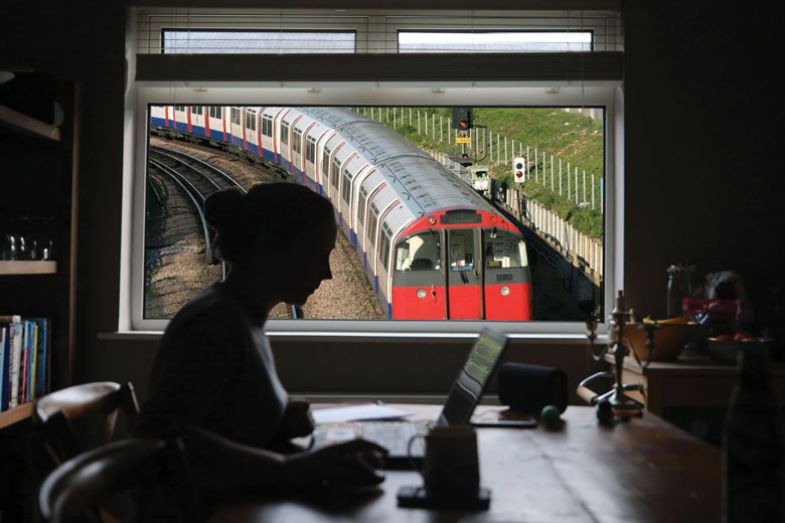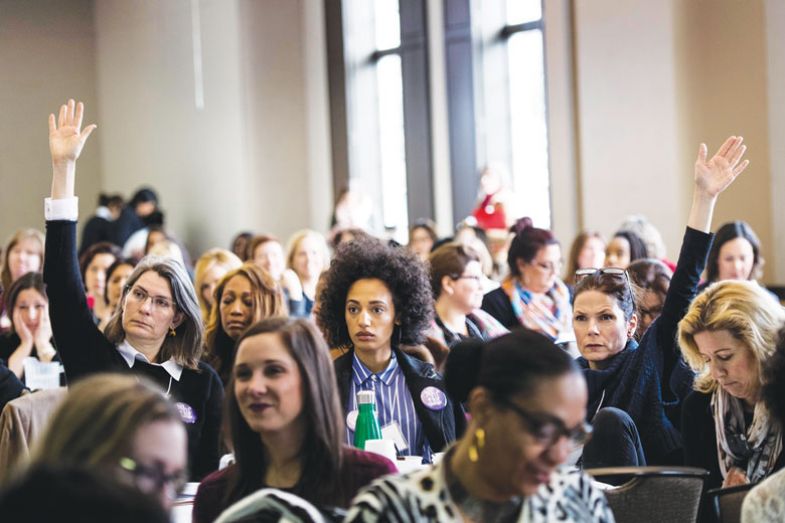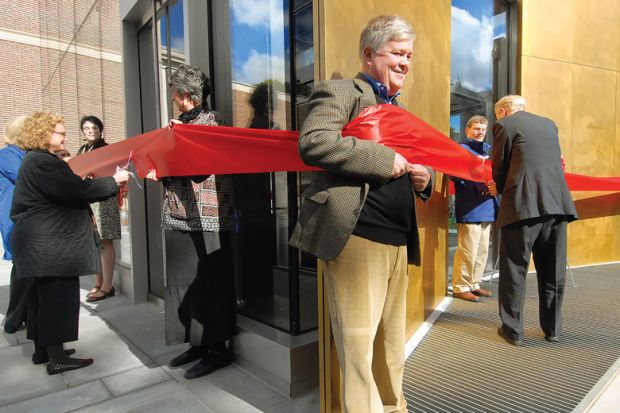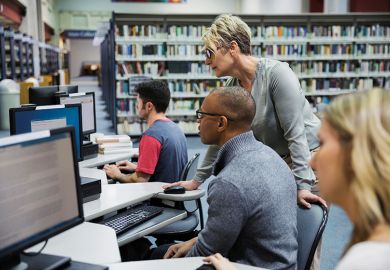Getting back to the stacks
When it’s finally safe to return to campus, I will dive headlong into the east wing of the fourth floor of the Van Pelt-Dietrich Library.
According to the Library of Congress classification system, the H section contains most of the social science books relevant to my research, and it is between the rolling stacks that I will lose myself in something I like to call shelf research.
In those halcyon days before the advent of digital databases, I remember digging through the musty drawers of ancient card catalogues to find a text related to my subject matter. With the call number scratched out in pencil on a scrap of paper, I would hunt down the book. Then I would sit on the floor and take down about 10 books to the left and 10 books to the right of the one I’d searched for. Because librarians have arranged the books by subject matter, I usually find amazing sources that I would not have found by searching remotely through an electronic catalogue.

The tactility and smell of the old books – many of them lonely after years of disuse – fully immerse me in my research. Rather than flitting between a library search bar, my email and the thousand other distractions of the information age, I savour the quiet and stillness so conducive to sustained contemplative thought, occasionally waving my arm to trigger the motion-sensing overhead lights.
The shelves used to have permanent aisles, which made it easier to park oneself between them for hours at a time. Since my kind of old-fashioned shelf research is no longer in vogue, hanging out between the now moveable stacks can be dangerous. Some must be hand cranked to move, but others have automatic motors. Even though signs explicitly advise patrons to look out for other researchers, this part of the library feels so deserted that younger users forget to check. I have often found myself on the verge of being sandwiched between two wall-sized rolling bookshelves like Luke, Han, Leia and Chewbacca in the trash compactor on the first Death Star.
“Hello!” I cry. “There’s someone here!”
Apologies combined with looks of profound suspicion always follow. What is that strange woman doing on the floor? Alone. The only reason to be hiding between the shelves has nothing to do with academic enquiry. University students have sex in the stacks and, according to at least one source, the Van Pelt stacks were once one of the hottest places on college campuses to reciprocally study human anatomy. The possibility of disturbing the mating habits of American youth means that my shelf research will most likely be done before 10am (when early adult libidos plunge towards their nadir).
But, really, who am I to judge? I imagine those dusty old books love the company – in whatever form it takes.
Kristen Ghodsee is professor of Russian and east European studies at the University of Pennsylvania.
Embracing long-term hybrid working
After 10 years as a university press officer, commuting from outside London or across the city, homeworking has been a revelation.
This is just my personal experience as a mid-thirties, unmarried woman with no kids, living in a rented flat that eats up a vast proportion of my salary but, luckily, does have space to swing a cat, or at least watch endless hours of Netflix with a couple of them. But reclaiming the time I would spend making myself look presentable for work and getting to and from campus – a total of two to four hours a day – has been life-changing.
What I’ve chosen to do with that time has varied from week to week. Getting up at 8.50am for a 9.00am start has happened on more than one occasion, but so have extra hours of exercise and writing. Our workload has been consistently high, but without the distractions of a large open-plan office, it gets done. I also finished an MA in history and advanced my research for a book I have been planning for a while.
Homeworking and the absence of socialising have resulted in two significant developments. First, I haven’t had a single cough, cold or sore throat in a year and a half. Second, while my heating bill has certainly crept up, my finances have greatly benefited from cutting out takeaway coffees, supermarket croissants, lunchtime meal deals, Tube fares and buying nice shoes. Hence, this is the first time I’ve been able to consider the future. Owning property in London will never be possible, but if homeworking has led to saving money while being physically and mentally healthier and just as productive, might a one-bed on the coast be a possibility? Embracing long-term home- or hybrid working could be revolutionary for my generation.

I do miss the Goldsmiths campus and being surrounded by brilliant, passionate people doing creative, beautiful things. I will never again take for granted the chance to look in on an exhibition, talk, concert or performance on any given night. A student dumping a truckload of carrots on campus last year in the name of art caused some controversy (and certainly kept us busy in the press office), but it also sums up what I miss most about being in New Cross. Nothing that weird ever happens in my living room.
Sarah Elizabeth Cox is media relations officer at Goldsmiths, University of London.
Recovering the sense of touch
The first thing I’m going to do after I return to campus under normal conditions is to touch as many people as possible.
Hug, shake hands, fist-jab – whatever feels like the most authentic way of telling my friends, colleagues, students and the world that we’ve made it, that we’ve lived through a patch in the history of humanity that has been a collective nightmare, a global war against an alien body.
I recently read a beautiful and disturbing excerpt from Sushma Subramanian’s recent book How to Feel: The Science and Meaning of Touch. This makes a fascinating argument about how Western culture de-privileges touch among the senses, from Plato to the touchpad screens of today’s gadgets (which disembody the kind of touch that was real in a pre-iOS generation of technology).
The absence of touch, Subramanian says, is both symptom and cause of loneliness in Western society. Given how radically different Indian society is in terms of family, social relations, religious rituals and work habits, we may not experience loneliness in quite the same way, but this society, too, places various restrictions on touch, notably between the sexes, classes and castes.

But this past year has been a great leveller across the globe. Touch and breathing in proximity have become taboo, a development powered not by prejudice but by science. Before socialising with people outside the family, we’ve become used to asking questions that eerily echo those asked by people seeking more private modes of intimacy. Is it safe to be around you? Covid has given this cautionary query a whole new meaning.
Having a seven-year-old at home – one who likes to practise rock-climbing on my knees and shoulders every now and then – I cannot claim to be in the kind of touchless pit into which the pandemic has thrown so many this past year. And yet the first thing I would like to reclaim from my first “normal” day back on campus is a sense of my own body. My sense of it has profoundly shifted during this spell, turning habits such as haircuts, shaving and exercise into irregular affairs. The social phenomenology of one’s appearance felt so acute before – how I look seems to matter a lot less if most people don’t see me any more, or not beyond the half-real, Zoom-carved bust.
Re-entering physical campus life will feel like a rebirth, in equal parts alienating and rejuvenating. I’ll cry in relief when, on entering a classroom, I won’t need to ask anyone to check their wi-fi setting or turn their camera on in order to be visible. But it may take a while to start remembering to say “Can you please speak up a little?” rather than just “You are on mute”.
Saikat Majumdar is professor of English and creative writing at Ashoka University in India.
Reclaiming my bookshelves – and the chance for a celebratory lunchtime drink
I’d be beyond excited to get back to the old regime if that ever becomes feasible again.
In theory, most of what I do (writing grants and papers, meetings, teaching prep) is possible from home. But some of the crucial ingredients are still missing. In pre-pandemic life, my lab members could excitedly pop into my office to show me a new result, for instance. And I used to go for lunch with colleagues every day, which provided an invaluable sounding board for all kinds of academic issues, apart from just being fun. We’ve been doing weekly Microsoft Teams lunches the whole way through the lockdown, in a slot marked “important science meeting” on my calendar. It could equally have been labelled “moan-a-thon” or “group therapy session” as it fulfilled those purposes too – but, frankly, I need that more than once a week!
It sounds crazy, but I also miss my London Underground commute. Being well read is a huge part of my identity and, until the pandemic, I hadn’t quite grasped that commuting was my main opportunity to read. The loss of that chunk of time, together with all the other pressures of lockdown (homeschooling, lecture recording, pastoral care of struggling students), means that the number of books I’ve read this year is pitiful – in stark contrast to the number I’ve bought. Let’s just say I will have plenty of catching up to do.

I haven’t set foot in my office for over a year and I guess first up I will gingerly open my desk drawers to see what snacks I abandoned, desperately hoping a new ecosystem has not burst forth. Next, I will take in the shelves of books I left behind, dipping into one or two. I’ve missed my Collected Dorothy Parker and there are several books I’ve sought at length at home (including my copy of Don Paterson’s Orpheus, whose apocalyptic pages I’ve longed for more than once recently) and am relying on finding in my office. Then I will snap into action and switch on my beloved dual-boot desktop hoping for signs of life.
At lunch, I think pints will be in order – the only other times we’ve done that were on the day of the Brexit referendum result and when Trump won the presidential election, so it will be nice to have a celebratory reason for lunchtime drinking.
Will I miss my six-year-old kid-bombing every important meeting or lecture, adding crazy backgrounds and endless cheetah gifs to the chat? Possibly a little. And I will have to wear shoes again, I suppose; but I say, “Bring it on!”
Rivka Isaacson is reader in chemical biology at King’s College London.
Transgressive kisses and the forgotten joys of Q&A sessions
The 2021 academic year began in Australia at the end of February and the return of the old familiar atmosphere has been a balm for the scholarly soul. It is the incidental things that have made me happiest: students chatting as they lounge on the lawns in the sunshine, a library full to the brim, and the joy of being able to poke one’s head into a colleague’s office or bump into them in the corridors.
What surprised me most, however, was just how much I enjoyed my first in-person conference. Every year at the start of March, the Australian Centre for Public History runs GLAMSLAM – an event for those who work in and with galleries, libraries, archives and museums. GLAMSLAM has bookended my Covid experience. It was the last conference I attended before life contracted to a computer screen, and the first in-person event I went to after it opened up again. I experienced a strange sense of familiarity as questions bounced back and forward across the room, as if long-dormant muscles were waking up.
There was a thrill of excitement as people nervously shook hands, with some even greeting each other with a kiss on the cheek – a seemingly everyday act that now carries the frisson of transgression. Indeed, one of the attendees evidently found all that physical proximity positively dislocating. Having only just emerged from her mandatory two-week hotel quarantine after a year in the UK, she can be seen in the group photograph standing off to one side – the two-metre rule now inscribed into her habits.

For all my joy at the resumption of things, it is already clear that the new normal will not resemble the old. While online platforms were key to enabling classes to continue during lockdown, aspects of them (at least at my institution) are here to stay. Some students are already talking about missing the experience of lectures that brought them on to campus and enabled them to interact with each other, both in the classroom and outside it.
All this has again brought to the fore questions about what university is for, what it means to those undertaking it and why that matters to societies. To what extent does an educational experience require what the American pragmatist philosopher, John Dewey, called a “community of inquiry”? That is something to contemplate as we wander down the departmental corridor trying to remember which office door is ours.
Tamson Pietsch is associate professor in social and political sciences, and director of the Australian Centre for Public History, at the University of Technology Sydney. In 2020, she hosted “The New Social Contract” podcast, which explored the changing relationship between universities, the state and the public.
The joy of the unscheduled meeting
Nothing works quite as well in academic life as the serendipitous meeting. Such encounters happen in the corridor, the kitchen area or on the street, where an initial “How are you?” can blossom into the most fascinating exchange of ideas. There is no expectation and no agenda. If the participants are in the mood, the discussion can go anywhere: ideas freely traded, off the record, with all parties welcome to leave or stay as long they want, maybe continuing at a new venue.
On my first day back in the department, therefore, I expect I will be hanging around, doing nothing in particular (more than ever before!), now that working from home has made me very conscious of the true value of the unscheduled meeting for both our intellectual lives and our psychological well-being. Long-term academic productivity and creativity will only increase by our being back in our departmental offices, questioning, challenging, encouraging and supporting each other.
Many say that Covid has changed the world forever and that academia will never go back to how it was. That may be true, but I still hope universities will see there are some things that we should not sacrifice. In particular, I am thinking of in-person conferences, for which online events have proved a poor substitute.
So I will be back to physical conferences as soon as it’s safe. The value of these gatherings is not just the scholarly programme but the informal conversations in the breaks, at dinner, while waiting around or walking to the venue, when a topic ignites spontaneously. These can sometimes be the most significant discussions in a research career. The most efficient means of knowledge production remains human interaction, and that is what I’ve sorely missed.
Stephen Mumford is professor of metaphysics at Durham University.
POSTSCRIPT:
Print headline: What I’ve missed about my former life…
Register to continue
Why register?
- Registration is free and only takes a moment
- Once registered, you can read 3 articles a month
- Sign up for our newsletter
Subscribe
Or subscribe for unlimited access to:
- Unlimited access to news, views, insights & reviews
- Digital editions
- Digital access to THE’s university and college rankings analysis
Already registered or a current subscriber? Login








